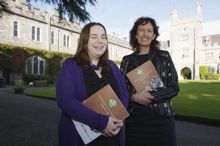2010 Press Releases
31.08.2010
Educationally disadvantaged students’ chances of going to college have been given a boost with the offer of over 1650 college places through the DARE and HEAR initiatives.
This is a 61% increase on the number of offers made in 2009. The Disability Access Route to Education (DARE) and the Higher Education Access Route (HEAR) give a points reduction to disadvantaged students and students with disabilities thus increasing their chances of success in getting to Third Level.
In the run up to the Leaving Cert 2010 the schemes were integrated into the CAO application system and opened up to secondary school students nationwide, with a record number of applications being received. The accesscollege.ie website was also launched as part of a targeted marketing campaign. Development of the schemes was supported by the Department of Education’s Strategic Innovation Fund.
These latest developments underscore the continuing commitment of the Irish Higher Education sector to tackling social exclusion. In June 2008 the HEA National Access Office launched the National Action Plan for Equity of Access to Higher Education 2008‐2013, setting out ambitious targets and equity of access measures for the next 5 years. Those targets include an entry rate of at least 54% for all socio-economic groups by 2020 and a doubling of the number of students in 3rd level with sensory, physical and multiple disabilities by 2013. According to Ann O’Brien, Chairperson of the DARE and HEAR Schemes, “the significant increase in the number of offers made this year is a welcome sign that these schemes are on track to meet national targets. It also offers encouragement to students from these groups to begin considering higher education as a real option in the future."
Access schemes are effective in overcoming the effects of disadvantage as shown by the recently published Trinity Access Programme (TAP) report which shows that the quality of degrees attained by access graduates mirrors those attained by other graduates. However, continuing efforts are needed in this area as shown in recent Geary Institute research which demonstrated that students from socioeconomically disadvantaged backgrounds have lower earnings expectations.
“The current economic climate reinforces the importance of tackling exclusion, said IUA Access Manager Maureen Dunne, as disadvantaged groups are even less likely to get jobs in a tight labour market, and this problem is magnified greatly for people with lower educational attainment. The HEAR and DARE initiatives help overcome this problem by boosting access to college and helping disadvantaged students fulfil their true potential”.
Picture: UCC postgraduate student, Anne-Marie Scarry with Mary O’Grady, Disability Support Officer, UCC at the launch of the Disability Access Route to Education (DARE).
1527MMcS

